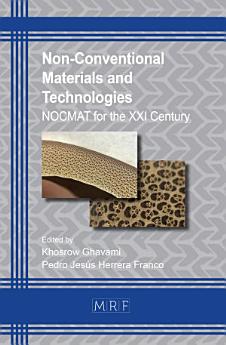Non-Conventional Materials and Technologies: NOCMAT for the XXI Century
Khosrow Ghavami · Pedro Jesús Herrera Franco
Nov 2018 · Materials Research Forum LLC
Ebook
820
Pages
family_home
Eligible
info
reportRatings and reviews aren’t verified Learn More
About this ebook
The book presents new research in the area of biobased “green composites”. Biobased materials involve renewable agricultural and forestry feedstocks, including wood, agricultural waste, grasses and natural plant fibers. These lignocellulosic materials are composed mainly of carbohydrates such as sugar and lignin, cellulose, vegetable oils and proteins. Much research is concerned with renewable materials such as bamboo, vegetable fibers, soil composites and recycled materials such as rice husk ash and sugar cane ash. The general aim here is to use renewable and non-polluting materials in ways that offer a high degree of sustainability and preserve the remaining natural resources for future generations. Keywords: Biobased Materials, Renewable Materials, Non-polluting Materials, Sustainability, Wood, Agricultural Waste, Grasses, Natural Plant Fibers, Lignocellulosic Materials, Carbohydrates, Sugars, Lignin, Cellulose, Vegetable Oils, Proteins, Bamboo, Vegetable Fibers, Soil Composites, Recycled Materials, Rice Husk Ash, Sugar Cane Ash, Fiber-reinforced Concrete, Post-disaster Reconstruction, Guadua Fibers, Prefabricated Bamboo Guadua Panels, Multi-Level Bamboo Structures, Alkaline Activated Cements, Polymer Residues Reinforced with Glass Fiber, Composites Reinforced with Vegetal Fibers, Sisal Fibers, Bamboo Arch Structure, Adobe Reinforced with Wheat Fibers, Fiber Reinforced Microconcrete, Cements with High Coal Waste Contents, Natural Composites, Geopolymer Concretes.
Rate this ebook
Tell us what you think.
Reading information
Smartphones and tablets
Install the Google Play Books app for Android and iPad/iPhone. It syncs automatically with your account and allows you to read online or offline wherever you are.
Laptops and computers
You can listen to audiobooks purchased on Google Play using your computer's web browser.
eReaders and other devices
To read on e-ink devices like Kobo eReaders, you'll need to download a file and transfer it to your device. Follow the detailed Help Center instructions to transfer the files to supported eReaders.






